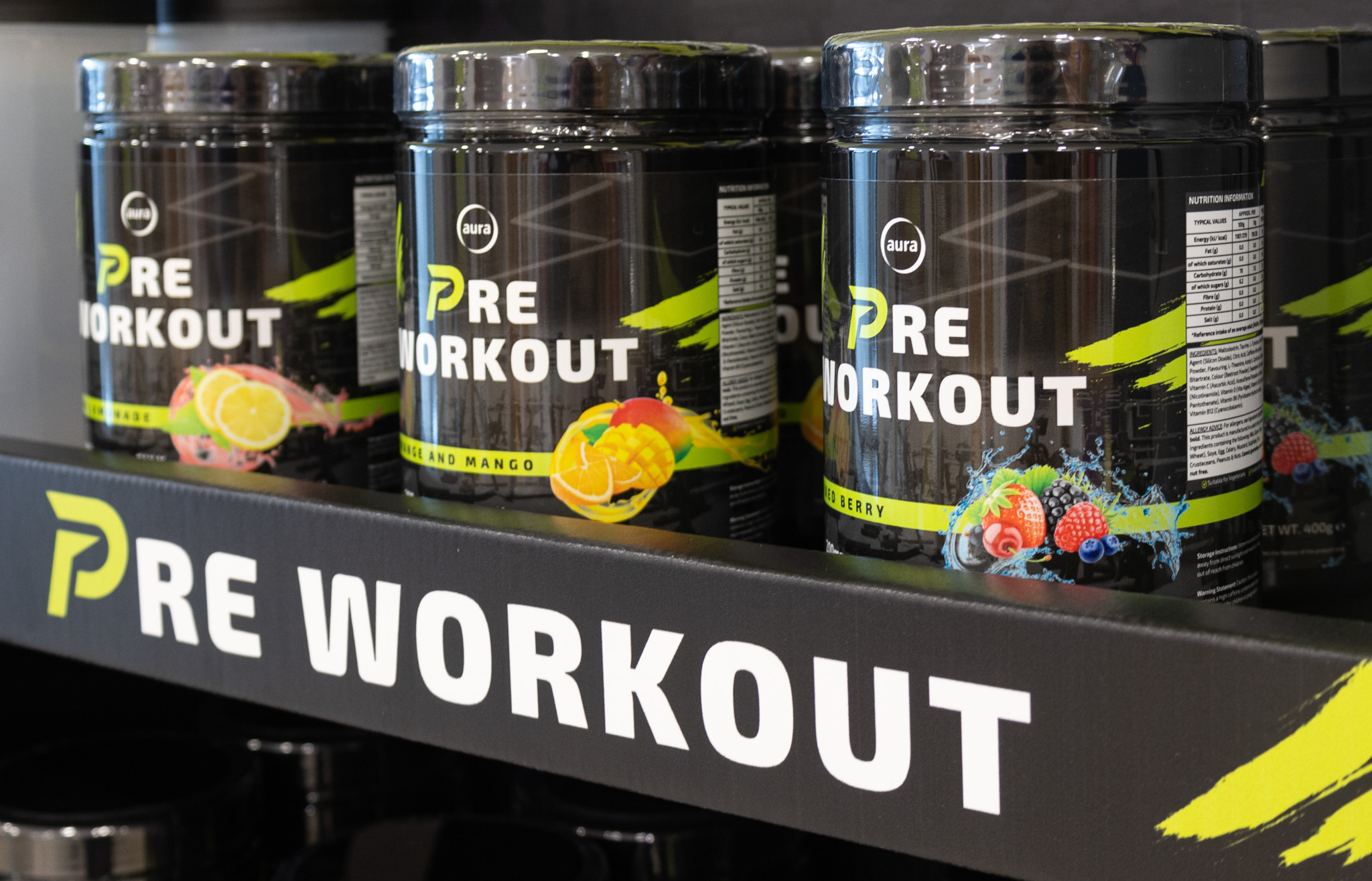In today’s fitness-centric world, there’s no shortage of strategies, supplements, and routines that promise to optimise your health and workouts. As you dive into this world of optimisation, you may have come across the term “pre-workout.”
So, with many athletes swearing by their pre-workout powder or drink, is it worth it? What is a pre-workout supplement anyway? Is it safe?

Whether you’re a seasoned athlete or someone just embarking on their fitness journey, in this article, we take a look at everything pre-workout – helping you determine whether it makes sense to add it to your routine. So, let’s jump in.
Pre-Workout Benefits and Its Purpose
What is pre-workout for exactly? Basically, pre-workout supplements are designed to prepare the body for the physical challenge ahead. They often work to increase energy levels, helping you push through your upcoming exercise routine.

But not all pre-workout is created equal. These supplements may contain different ingredients, such as caffeine, amino acids, creatine, beta-alanine, and more. It all depends on what you get.
- Enhance energy levels
- Improve performance
- Increase mental alertness
- Optimise nutrient delivery
- Increase blood flow
So, how do you know which type of pre-workout you should take?
Pre-Workout Powder, Drinks, Tablets & Shots
Pre-workout powder is exactly as the name states. It is a powder that can easily be mixed with water or another beverage.

Pre-workout drinks, which often come in can or bottle form, also offer an easy go-to that can be grabbed on the run. Tablets and pre workout shots, on the other hand, provide a quick way to ensure you get the proper dosage without any fuss of having to drink an entire bottle.
Ultimately, the best pre workout is whatever works best with your lifestyle. Thus, this often comes down to a personal preference.
What’s in Preworkout Supplements?
Common ingredients found in preworkout supplements include:
Caffeine

A well-known stimulant, caffeine is often the primary active ingredient in many pre-workouts. It helps boost energy levels, improve concentration, and can even enhance fat burning. It’s the same compound that wakes you up in your morning coffee, but in a pre workout context, it’s there to ensure you remain alert and energized throughout your exercise.
Beta-Alanine
Ever felt a tingling sensation after consuming a pre-workout? That’s often due to beta-alanine. This amino acid can buffer acid in muscles, potentially helping to reduce muscle fatigue and allow for more extended, more strenuous workouts.
Creatine

A staple in the fitness community, creatine is involved in forming ATP, the body’s primary energy molecule. Creatine supplementation is well-studied for its positive impact in enhancing muscular strength and power.
L-Citrulline
This amino acid is known for improving blood flow. When consumed, it converts to nitric oxide in the body, which can dilate blood vessels and increase nutrient delivery to muscles, potentially enhancing performance and recovery.
B Vitamins

Essential for energy production, B vitamins in pre workouts help metabolise our food into usable energy, ensuring that our body has the fuel it needs during exercise.
Electrolytes
Vital for muscle function, electrolytes like sodium, potassium, and magnesium, are sometimes added to preworkouts to aid in hydration and prevent muscle cramps.
Other Ingredients
Many preworkouts can also contain a variety of other ingredients, such as amino acids like BCAAs, plant extracts, and other performance enhancers. The combinations can vary widely based on the brand and specific product goals.
When to Take Pre-Workout

Most recommend taking pre-workout 20 to 30 minutes before your exercise routine. This allows active ingredients, such as caffeine, to enter your bloodstream and begin having an energising effect.
At the same time, always ensure you follow the directions on your specific pre-workout.
How Long Does Pre-Workout Take to Kick In?

As you might be able to guess, pre-workout kicks in about 20 to 30 minutes after taking it. However, activation time may be influenced by individual tolerances to ingredients, other food eaten around the same time, individual differences in digestion and absorption, and formulation variability.
The best way to know for yourself is by taking your pre-workout and taking note of the time. This will help you better understand how long before your workout you should take your pre-workout supplements.
Pre-Workout Side Effects

You might wonder, ‘Is pre-workout safe?’ The truth is that most pre-workout is safe, with side effects usually uncommon or not too serious. However, they may include:
- Jitteriness
- Headaches
- Increased heart rate
- Increased blood pressure
- Digestive issues
- Dehydration
- Dependency
- Allergic reactions
Pre-Workout for Women

For instance, pre-workout for women may contain fewer calories and lower amounts of caffeine. It may also contain beneficial ingredients for hormonal balance, as well as ingredients supporting bone health, iron levels, skin health, and more.
Answering Your Pre Workout Queries
Got more pre-workout questions? We have answers. Check out the section below.
What Does Pre-Workout Do?

Pre-workout supplements are designed to increase energy, improve endurance, enhance focus, and optimise performance during exercise by combining various active ingredients like caffeine, amino acids, and vitamins. They help prepare the body and mind for intense physical activity, potentially leading to more effective workouts.
Is It Good or Bad to Take Pre-Workout?
Taking pre-workout can enhance energy, focus, and workout performance. However, it may cause side effects in some individuals, such as jitters or digestive issues, especially if overconsumed. It’s essential to use as directed, consider individual tolerance, and potentially consult with a healthcare professional before use.
Is Pre-Workout Just Caffeine?

No, pre-workout contains a variety of ingredients beyond caffeine. Depending on the brand or type you select, pre-workout may include amino acids, creatine, B vitamins, electrolytes, and more.
Is Pre-Workout Good for Beginners?
Pre-workout for beginners can boost energy and focus during workouts. Yet, as a beginner, it’s important to start with a lower dose and assess any side effects before continuing with your chosen supplement.
When Should I Take Preworkout?

Pre-workout is best taken about 20 to 30 minutes before your workout. However, this may vary depending on the individual and product.
Is Preworkout Addictive?
Pre-workout itself isn’t addictive. Yet, substances in the pre-workout can lead to addiction, such as caffeine.
Is Pre-Workout Good for Running, Cardio, and Fat Burning?

Is Preworkout Bad for Your Heart?
When misused, pre-workout can have a negative impact on the heart. This is largely due to its ability to increase heart rate and blood pressure, largely because of its caffeine content. However, when taken correctly, this usually isn’t a concern.
If you have any concerns regarding pre-workout and your heart health, it’s always a good idea to discuss your options with your doctor first.
How Long Does Pre-Workout Last?

The duration will often depend on the individual. For instance, caffeine tolerance, amounts, and dosages can impact the length of any pre-workout effects. For most individuals, pre-workout peaks after about 30 to 60 minutes and lasts up to three to six hours.
Should I Get Pre-Workout Without Caffeine?
This is entirely an individual preference. If you find you’re sensitive to caffeine, it may be worthwhile to find a pre-workout with a lower or zero caffeine content. Additionally, if you tend to workout later in the day, having pre-workout without caffeine is a good idea to avoid any sleep interference.
Can I Take Pre-Workout Every Day?

Taking pre-workout every day is not recommended. This can create tolerance, dependency issues, and even increase side effects, such as digestive distress.
How Much Pre-Workout Should I Take?
The appropriate amount of your selected pre-workout should be indicated on the label. A few factors to consider include the recommended dosage, starting small, your body weight, and your caffeine tolerance.
Does Pre-Workout Affect Sleep?

Pre-workout can impact sleep when it contains caffeine and is taken later in the day. It may also impact sleep for those who are more caffeine-sensitive.
Maximise Your Workout Potential with Pre Workout from Aura Leisure


